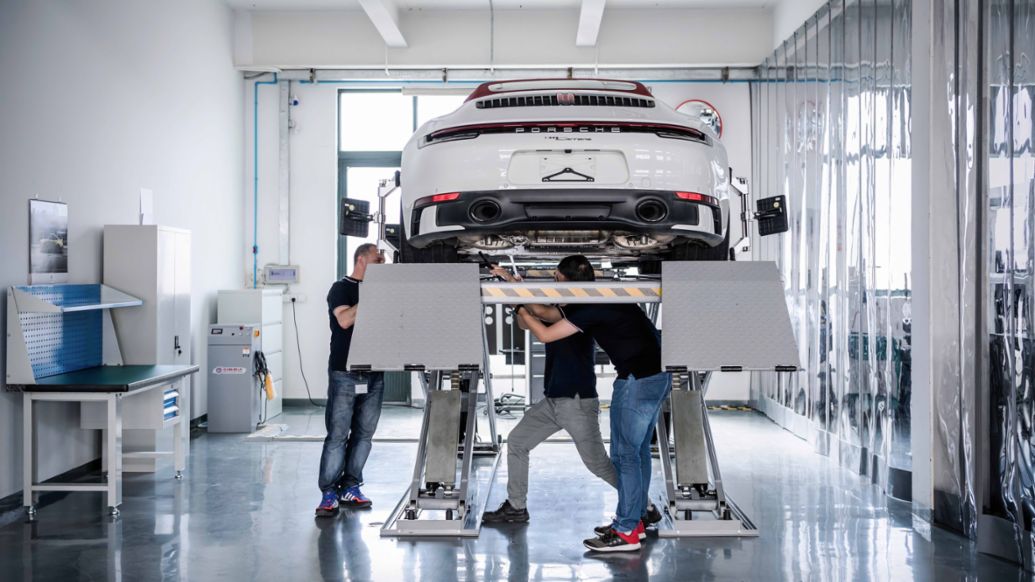Inchcape has continued its recent string of UK dealership disposals with the sale of its Oldham Volkswagen car franchise to Swansway Garages. Confirmation of the sale comes just a month after AM reported that Arden was poised to acquire Inchcape’s Cooper BMW and Mini car dealerships in Tunbridge Wells in the latest of a series… Continue reading Swansway Garages acquires Inchcape Volkswagen dealership in Oldham
Tag: VW
World NM: A Volkswagen executive says it sell more electric cars than Tesla by 2023000110
Elon Musk and Volkswagen’s chairman may have a friendly relationship, but another executive at the German auto giant wants to be clear that Tesla is still a major competitor. Go to Source
@Daimler: Project Geländewagen: a Mercedes-Benz and Virgil Abloh collaboration
Stuttgart. On September 8th, Project Geländewagen – the first outcome of a collaboration that is a first of its kind between Mercedes-Benz and Chief Creative Director and Founder of Off-White and Men’s Artistic Director of Louis Vuitton Virgil Abloh – was unveiled via a unique digital launch event. The conceptual design project, led by Mercedes-Benz… Continue reading @Daimler: Project Geländewagen: a Mercedes-Benz and Virgil Abloh collaboration
@VW Group: Volkswagen teases new compact SUV
Sep 8, 2020 New compact SUV to slot under Tiguan in the Volkswagen lineup Second proof point of Volkswagen’s doubling-up strategy for SUVs Official reveal on 10.13.20 Herndon, VA — Volkswagen released the first image and video today of its new compact SUV. This new offering will slot under the Tiguan, and is the second… Continue reading @VW Group: Volkswagen teases new compact SUV
@VW Group: Volkswagen sets course for green electricity to power all freight carried on Deutsche Bahn
Volkswagen Group Logistics is switching all Deutsche Bahn carriage of materials and vehicles within Germany to green electricity by the start of 2021. This will cut over 26,700 tonnes of CO2 emissions a year compared to the conventional electricity mix. 95 per cent of all such transportation is already powered by green electricity. In addition… Continue reading @VW Group: Volkswagen sets course for green electricity to power all freight carried on Deutsche Bahn
@VW Group: Porsche Digital opens location in Croatia
The Porsche Newsroom is a service provided by the Porsche Communication for journalists, bloggers and the online community. © 2020 Dr. Ing. h.c. F. Porsche AG * Data determined in accordance with the measurement method required by law. Since 1 September 2017 certain new cars have been type approved in accordance with the Worldwide Harmonised Light… Continue reading @VW Group: Porsche Digital opens location in Croatia
The Station: Yandex spins out self-driving biz, Ike takes the SaaS road and a solid-state battery startup strikes SPAC
The Station is a weekly newsletter dedicated to all things transportation. Sign up here — just click The Station — to receive it every weekend in your inbox. Hello and welcome back to The Station, a newsletter dedicated to all the present and future ways people and packages move from Point A to Point B. As… Continue reading The Station: Yandex spins out self-driving biz, Ike takes the SaaS road and a solid-state battery startup strikes SPAC
@VW Group: Chiron Super Sport 300+ and Chiron Pur Sport – Bugatti’s broad spectrum of performance
The circular track, 12.6 kilometers long and four kilometers in diameter. The outer edge tilts towards the centre by more than 12 degrees – ideal for top speeds. The Nardò proving ground in Apulia, Italy, is considered the fastest vehicle circuit in the world – making it the ideal test site for the Bugatti Chiron… Continue reading @VW Group: Chiron Super Sport 300+ and Chiron Pur Sport – Bugatti’s broad spectrum of performance
@VW Group: ŠKODA AUTO DigiLab and transport company RegioJet enter into all-embracing partnership
Imagine taking an electric scooter to the coach or train station, then hopping on a coach or train to head to another city and from there renting a shared car for the last mile to your final destination. This is exactly what the collaboration between ŠKODA AUTO DigiLab and rail and coach operator RegioJet will… Continue reading @VW Group: ŠKODA AUTO DigiLab and transport company RegioJet enter into all-embracing partnership
@VW Group: Highly sought expertise
Not far from the world-famous Shanghai International Circuit, home to the Chinese Grand Prix, is the town of Anting – one of China’s earliest and most important automotive hubs. Shanghai Automotive Industry Corporation (SAIC) was founded there in 1984, with the joint venture SAIC-VW following in 1988. Today, start-ups like Nio and suppliers like Schaeffler,… Continue reading @VW Group: Highly sought expertise


